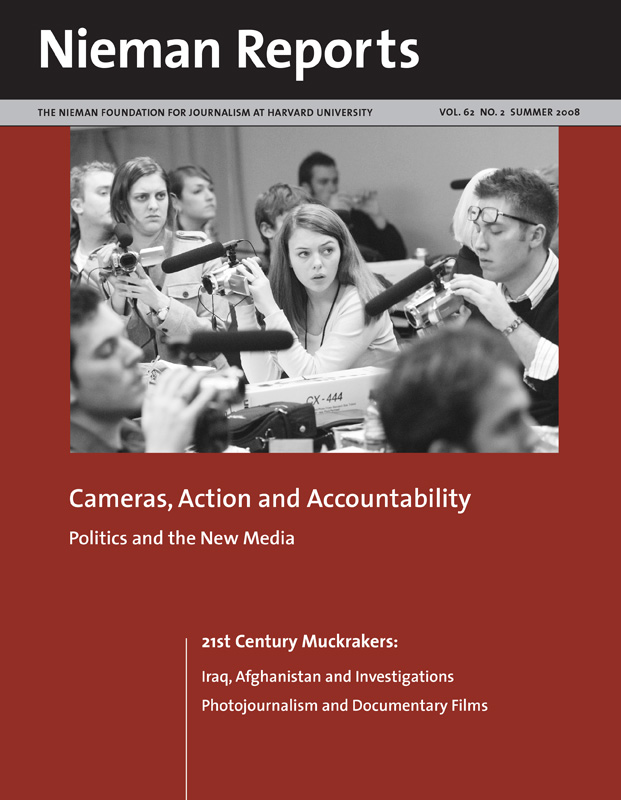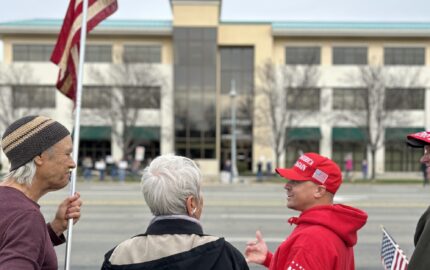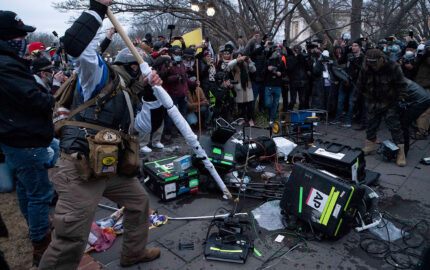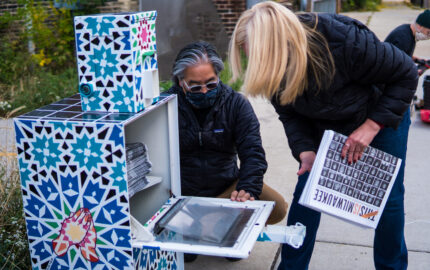In 1988, I wanted to be Maureen Dowd. That year the Republican convention was held in New Orleans. I was working for The Times-Picayune, and the paper embarked on a plan that would be unthinkable today: It would spend gobs of money on national campaign coverage. The ultimate goal was to produce insightful, hard-hitting papers during that one week in August the national media came to town, thus boosting the paper's then-middling reputation.
Along with a half-dozen other very green Times-Picayune reporters, I decamped to Iowa and New Hampshire. Then we later trekked around the country following George H.W. Bush, Michael Dukakis, Bob Dole, Jesse Jackson, and the rest. The paper also hosted a giant convention-week media party, catered by an all-star lineup of New Orleans restaurants and featuring the Neville Brothers. Was all this worth the investment? Maybe. Twenty years later, journalists are still telling me how great that party was. But they don't remember much about our coverage of the Iowa caucuses.
Attitude Arrives
I emulated Dowd because she brought attitude to the campaign, capturing its absurdities and contradictions — something that straight newspaper coverage rarely did. Her success brought something of the subversiveness of the "Boys on the Bus," the New Journalism, and Hunter S. Thompson to that blandest of mass culture organs, the daily newspaper. It was a sensible response to the artifice of the Reagan years: Follow a candidate around for long enough, and no amount of message discipline or consultant packaging could hide certain truths. When I witnessed a now-famous incident — Michael Dukakis's helmeted head poking out of a rolling tank at a factory in Michigan — my determination to be even-handed melted away; the only possible human reaction was an amazed snicker.
Two decades later, though, Dowdism has taken the media, and the campaign culture itself, down a troubled path. The character-based journalism she champions has become the driving force in campaign coverage. The media are constantly on the lookout for the odd moment that might capture some revealing truth about a candidate — and, ideally, create a feeding frenzy that consumes the campaign. In 2000, Al Gore's exaggerated sighing during a debate, his TV makeup, and even the color of his clothing became media obsessions. In 2004, it was John Kerry's supposed cultural elitism: the windsurfing, the request for Swiss on his Philly cheesesteak. The problem is, such issues are almost always essentially trivial, having little to do with substantive issues or how a candidate might actually behave once in office.
We can't lay this all on Dowd. Many people have a vested interest in "gotcha" politics. Political consultants are paid to push all the buttons that will keep a feeding frenzy going. The furious daily news cycle is driven by catchy, personality-based news bites. The talking heads on CNN and Fox have to say something to fill up all those hours, and "character" offers an irresistible, chatty entrée into politics. And the media have effectively (if bewilderingly) assigned Matt Drudge — the quirky, right-wing hawker of gossip and opposition research — the role of arbiter of the news cycle.
Form and Content Change
Just as it was when Dowd first came on the scene, today the mainstream media's campaign narrative has become increasingly detached from reality. Newspapers, magazines and TV are in an epochal decline, their economic foundations and social relevance crumbling as more and more people migrate online for their news. These technology-driven changes have eroded the media's legitimacy and authority, causing befuddlement and flat-footedness in a changing political environment. Most media outlets failed to deeply probe the Bush administration's weak rationale for invading Iraq. Later, many journalists never fully grasped how radical a shift was underway as the White House sought to amass executive power while systematically marginalizing the watchdog functions played by Congress and the press itself.
Political journalists are still a small, exclusive club — the so-called "Gang of 500" — revered only semi-ironically by ABC's "The Note." Like temple guardians, they dole out information and analysis from on high. Now, though, thanks to the bottom-up nature of the Internet, a much larger and more diverse campaign media ecosystem has emerged, and with it a shift in the nature of political journalism. Dowd represented a shift in style; now it's the form as well as the content of the political-media conversation that's changing.
Information now flows not just in one direction, but many. Political blogs are arguing from the left, right, the fringe, and the middle. Some of them, such as Joshua Micah Marshall's Talking Points Memo site, do original, sometimes groundbreaking, reporting. Others, such as Daily Kos (liberal) and Townhall.com (conservative), are big marketplaces for ideas, commentary and speculation of a particular political stripe. Some Web sites, such as YouTube, aren't political per se but have become powerful vehicles for disseminating political information. And some sites have a little bit of everything. The Huffington Post, for instance, features bloggers (including, occasionally, me), straight political news, original reporting by professionals such as Thomas B. Edsall, and dispatches by "citizen journalists" on its Off the Bus site.
For political junkies and interested citizens alike, this has been revelatory. A vital, participatory political conversation is going on. You can learn more about the state of campaign dynamics by reading a few smart political blogs than by wading through the day's political coverage in The New York Times. (There is, of course, the Times's own political blog, The Caucus, an indication of mainstream media's awareness of the central role blogs now play in political coverage.) The best bloggers cull the relevant coverage from a range of sources, analyze and critique it, and point out the best and the worst of it.
Expert Criticism
Take the case of Glenn Greenwald, who blogs on Salon.com. Greenwald is fascinating precisely because he represents this new paradigm. A former constitutional law and civil rights litigator, Greenwald is an aggressive and humorless polemicist — not a fun read, but always a provocative one. He focuses mainly on issues of constitutional import, attacking U.S. government-sponsored torture and surveillance. In this capacity, he's a member of a growing cohort of bloggers with professional expertise who can offer deeper insights into specialized issues than most any reporter can.
But it's Greenwald's harsh press criticism that's most interesting. The Washington press corps is too insular, too fond of its role in the government-media establishment, and too cowed by the success of conservative-leaning media outlets such as Fox News, Greenwald believes. This combination of blinkered caution and high-handed clubbiness, he contends, creates the now-familiar echo-chamber effect of "character" coverage and gives it a distinctive, quaintly Reagan-era point of view, with Democrats routinely portrayed as weak on the issues of war and terrorism, out of touch with what voters are thinking, and at constant risk of losing their tenuous support.
Greenwald's rhetoric can be grandiose. His attacks drip with contempt. But the case he makes is more compelling than the now-predictable clichés that we hear all the time from the talking heads and the tired assumptions that shape campaign coverage. The fact that most polls show voters think it's Republicans who are out of touch lends credence to his critique — and suggests that the political landscape has indeed changed dramatically in ways the press has failed to recognize.
There are dozens of Greenwalds out there critiquing the media now from the left and the right, and they have an impact, if only in forcing members of the news media to respond. The day after an April ABC News Democratic debate focused relentlessly on Obama "character" concerns, the left blogosphere was unanimous in its condemnation. Even mainstream media sources, including Time magazine and The Washington Post's Tom Shales, concurred. George Stephanopoulos, who co-moderated the debate, defended himself in an interview with Talking Points Memo.
News Emerges
Such critiques represent merely a rhetorical change, not a substantive one. Is this larger and more diverse media ecosystem actually altering campaign dynamics, or how voters perceive candidates? In some ways, yes. The Internet is integrated into the campaign culture. Blogger-journalists now routinely have scoops, and the mainstream media are more likely to acknowledge them. The ubiquity of YouTube videos makes it easier to see campaign events unfiltered — and catch gaffes such as the "macaca" quote that ruined George Allen's Virginia Senate reelection campaign. The Web has revolutionized campaign community building and fundraising, and campaigns routinely reach out to bloggers and Web sites that command big, partisan audiences. Barack Obama, for instance, chose the liberal Huffington Post as the platform for his first big statement explaining his position on his former church pastor, the controversial Jeremiah Wright.
And something downright revolutionary appeared to be afoot in April when Mayhill Fowler, a volunteer blogger for The Huffington Post's Off the Bus, reported Obama's now-infamous remarks that some working-class voters were "bitter" after years of economic distress and "cling to guns or religion." Fowler, an Obama supporter, was admitted to a San Francisco fundraiser that was closed to regular press coverage, where she recorded the remarks and then published them a few days later. Campaign staffers knew who she was and that she wrote for The Huffington Post but placed no restrictions on her when they let her into the fundraiser.
Score one for the citizen journalists: The more we hear from inside a campaign, the better. Interestingly, a half-dozen journalistic bright lines were blurred in this incident, a trend that will only continue as the conversation expands. What was Fowler, exactly? A journalist? A voter? Was she friend or foe to Obama? Guardian America's Michael Tomasky tried to wrap his mind around these questions, recommending a set of disclosure standards for citizen journalists covering politics. But the media environment is now sufficiently complex — there are now just too many different potential categories of people and information out there — that no rule book can possibly cover every circumstance.
While the ground rules for coverage are shifting unpredictably, little has changed in other ways. Because of tradition, inertia and command of the largest, most diverse audiences, the mainstream media still drive the campaign bus with the same old road map. Sure enough, for example, a classic feeding frenzy followed the "bitter" remarks. Media outlets had their revealing moment, and the idea that Obama's words displayed a typically Democratic form of condescending elitism became their obsession for days. Most of those making this observation were, of course, handsomely paid media elites who were neither avid hunters nor churchgoers. Polls, meanwhile, showed that the firestorm over the remarks made very little difference in Obama's support nationally or among potential voters in the upcoming Pennsylvania primary.
John McQuaid, a Washington writer, covered two presidential campaigns. He is the coauthor of "Path of Destruction: The Devastation of New Orleans and the Coming Age of Superstorms."
Along with a half-dozen other very green Times-Picayune reporters, I decamped to Iowa and New Hampshire. Then we later trekked around the country following George H.W. Bush, Michael Dukakis, Bob Dole, Jesse Jackson, and the rest. The paper also hosted a giant convention-week media party, catered by an all-star lineup of New Orleans restaurants and featuring the Neville Brothers. Was all this worth the investment? Maybe. Twenty years later, journalists are still telling me how great that party was. But they don't remember much about our coverage of the Iowa caucuses.
Attitude Arrives
I emulated Dowd because she brought attitude to the campaign, capturing its absurdities and contradictions — something that straight newspaper coverage rarely did. Her success brought something of the subversiveness of the "Boys on the Bus," the New Journalism, and Hunter S. Thompson to that blandest of mass culture organs, the daily newspaper. It was a sensible response to the artifice of the Reagan years: Follow a candidate around for long enough, and no amount of message discipline or consultant packaging could hide certain truths. When I witnessed a now-famous incident — Michael Dukakis's helmeted head poking out of a rolling tank at a factory in Michigan — my determination to be even-handed melted away; the only possible human reaction was an amazed snicker.
Two decades later, though, Dowdism has taken the media, and the campaign culture itself, down a troubled path. The character-based journalism she champions has become the driving force in campaign coverage. The media are constantly on the lookout for the odd moment that might capture some revealing truth about a candidate — and, ideally, create a feeding frenzy that consumes the campaign. In 2000, Al Gore's exaggerated sighing during a debate, his TV makeup, and even the color of his clothing became media obsessions. In 2004, it was John Kerry's supposed cultural elitism: the windsurfing, the request for Swiss on his Philly cheesesteak. The problem is, such issues are almost always essentially trivial, having little to do with substantive issues or how a candidate might actually behave once in office.
We can't lay this all on Dowd. Many people have a vested interest in "gotcha" politics. Political consultants are paid to push all the buttons that will keep a feeding frenzy going. The furious daily news cycle is driven by catchy, personality-based news bites. The talking heads on CNN and Fox have to say something to fill up all those hours, and "character" offers an irresistible, chatty entrée into politics. And the media have effectively (if bewilderingly) assigned Matt Drudge — the quirky, right-wing hawker of gossip and opposition research — the role of arbiter of the news cycle.
Form and Content Change
Just as it was when Dowd first came on the scene, today the mainstream media's campaign narrative has become increasingly detached from reality. Newspapers, magazines and TV are in an epochal decline, their economic foundations and social relevance crumbling as more and more people migrate online for their news. These technology-driven changes have eroded the media's legitimacy and authority, causing befuddlement and flat-footedness in a changing political environment. Most media outlets failed to deeply probe the Bush administration's weak rationale for invading Iraq. Later, many journalists never fully grasped how radical a shift was underway as the White House sought to amass executive power while systematically marginalizing the watchdog functions played by Congress and the press itself.
Political journalists are still a small, exclusive club — the so-called "Gang of 500" — revered only semi-ironically by ABC's "The Note." Like temple guardians, they dole out information and analysis from on high. Now, though, thanks to the bottom-up nature of the Internet, a much larger and more diverse campaign media ecosystem has emerged, and with it a shift in the nature of political journalism. Dowd represented a shift in style; now it's the form as well as the content of the political-media conversation that's changing.
Information now flows not just in one direction, but many. Political blogs are arguing from the left, right, the fringe, and the middle. Some of them, such as Joshua Micah Marshall's Talking Points Memo site, do original, sometimes groundbreaking, reporting. Others, such as Daily Kos (liberal) and Townhall.com (conservative), are big marketplaces for ideas, commentary and speculation of a particular political stripe. Some Web sites, such as YouTube, aren't political per se but have become powerful vehicles for disseminating political information. And some sites have a little bit of everything. The Huffington Post, for instance, features bloggers (including, occasionally, me), straight political news, original reporting by professionals such as Thomas B. Edsall, and dispatches by "citizen journalists" on its Off the Bus site.
For political junkies and interested citizens alike, this has been revelatory. A vital, participatory political conversation is going on. You can learn more about the state of campaign dynamics by reading a few smart political blogs than by wading through the day's political coverage in The New York Times. (There is, of course, the Times's own political blog, The Caucus, an indication of mainstream media's awareness of the central role blogs now play in political coverage.) The best bloggers cull the relevant coverage from a range of sources, analyze and critique it, and point out the best and the worst of it.
Expert Criticism
Take the case of Glenn Greenwald, who blogs on Salon.com. Greenwald is fascinating precisely because he represents this new paradigm. A former constitutional law and civil rights litigator, Greenwald is an aggressive and humorless polemicist — not a fun read, but always a provocative one. He focuses mainly on issues of constitutional import, attacking U.S. government-sponsored torture and surveillance. In this capacity, he's a member of a growing cohort of bloggers with professional expertise who can offer deeper insights into specialized issues than most any reporter can.
But it's Greenwald's harsh press criticism that's most interesting. The Washington press corps is too insular, too fond of its role in the government-media establishment, and too cowed by the success of conservative-leaning media outlets such as Fox News, Greenwald believes. This combination of blinkered caution and high-handed clubbiness, he contends, creates the now-familiar echo-chamber effect of "character" coverage and gives it a distinctive, quaintly Reagan-era point of view, with Democrats routinely portrayed as weak on the issues of war and terrorism, out of touch with what voters are thinking, and at constant risk of losing their tenuous support.
Greenwald's rhetoric can be grandiose. His attacks drip with contempt. But the case he makes is more compelling than the now-predictable clichés that we hear all the time from the talking heads and the tired assumptions that shape campaign coverage. The fact that most polls show voters think it's Republicans who are out of touch lends credence to his critique — and suggests that the political landscape has indeed changed dramatically in ways the press has failed to recognize.
There are dozens of Greenwalds out there critiquing the media now from the left and the right, and they have an impact, if only in forcing members of the news media to respond. The day after an April ABC News Democratic debate focused relentlessly on Obama "character" concerns, the left blogosphere was unanimous in its condemnation. Even mainstream media sources, including Time magazine and The Washington Post's Tom Shales, concurred. George Stephanopoulos, who co-moderated the debate, defended himself in an interview with Talking Points Memo.
News Emerges
Such critiques represent merely a rhetorical change, not a substantive one. Is this larger and more diverse media ecosystem actually altering campaign dynamics, or how voters perceive candidates? In some ways, yes. The Internet is integrated into the campaign culture. Blogger-journalists now routinely have scoops, and the mainstream media are more likely to acknowledge them. The ubiquity of YouTube videos makes it easier to see campaign events unfiltered — and catch gaffes such as the "macaca" quote that ruined George Allen's Virginia Senate reelection campaign. The Web has revolutionized campaign community building and fundraising, and campaigns routinely reach out to bloggers and Web sites that command big, partisan audiences. Barack Obama, for instance, chose the liberal Huffington Post as the platform for his first big statement explaining his position on his former church pastor, the controversial Jeremiah Wright.
And something downright revolutionary appeared to be afoot in April when Mayhill Fowler, a volunteer blogger for The Huffington Post's Off the Bus, reported Obama's now-infamous remarks that some working-class voters were "bitter" after years of economic distress and "cling to guns or religion." Fowler, an Obama supporter, was admitted to a San Francisco fundraiser that was closed to regular press coverage, where she recorded the remarks and then published them a few days later. Campaign staffers knew who she was and that she wrote for The Huffington Post but placed no restrictions on her when they let her into the fundraiser.
Score one for the citizen journalists: The more we hear from inside a campaign, the better. Interestingly, a half-dozen journalistic bright lines were blurred in this incident, a trend that will only continue as the conversation expands. What was Fowler, exactly? A journalist? A voter? Was she friend or foe to Obama? Guardian America's Michael Tomasky tried to wrap his mind around these questions, recommending a set of disclosure standards for citizen journalists covering politics. But the media environment is now sufficiently complex — there are now just too many different potential categories of people and information out there — that no rule book can possibly cover every circumstance.
While the ground rules for coverage are shifting unpredictably, little has changed in other ways. Because of tradition, inertia and command of the largest, most diverse audiences, the mainstream media still drive the campaign bus with the same old road map. Sure enough, for example, a classic feeding frenzy followed the "bitter" remarks. Media outlets had their revealing moment, and the idea that Obama's words displayed a typically Democratic form of condescending elitism became their obsession for days. Most of those making this observation were, of course, handsomely paid media elites who were neither avid hunters nor churchgoers. Polls, meanwhile, showed that the firestorm over the remarks made very little difference in Obama's support nationally or among potential voters in the upcoming Pennsylvania primary.
John McQuaid, a Washington writer, covered two presidential campaigns. He is the coauthor of "Path of Destruction: The Devastation of New Orleans and the Coming Age of Superstorms."



